Crash (1996)
I…
Me t….
To note first: this is not the Crash that won Best Picture at the 2005 Oscars. This is a 1996 movie by David Cronenberg about wanting to be/fuck a car crash. It’s also much better.
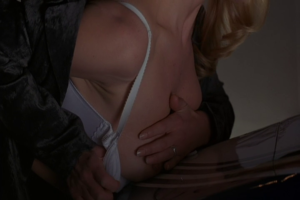
Breast, meet plane.
We begin, after the very unabridged credits, in a hangar, where a blonde woman (Deborah Kara Unger) is slowly baring her breast and laying it rapturously on a plane, communing with the plane, becoming the plane, until a man enters from behind, but he’s an afterthought to her and to us. We cut to the set of an action movie, where her husband (James Spader) is having sex with another woman in his office. His name is James Ballard, the name of the classic sci-fi author whose novel got Cronenberged into this. (Shouldn’t the character have been named Dave Cronenberg for the movie?)
They meet on a balcony for the post-coital debriefing, and it sounds as if no one has ever come in human history. “Maybe the next one,” she says, twice.
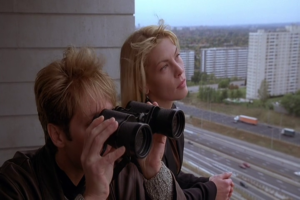
He gets in a car crash, injuring himself and killing the driver of the other car, but the other driver’s wife (Holly Hunter) survives to become our third out of four main characters. (In my head I kept calling her Dr. Melfi through the entire movie. Makes sense to me.)
Ballard’s wife jerks him off under the hospital covers while describing the car crash to him in immaculate detail. Well–now we know what his fetish is. He is drawn to where they’re keeping the remains of his car, where he runs into Dr. Melfi looking for her husband’s. They end up fucking. (Everyone in this movie ends up fucking.)
Ballard and Dr. Melfi go to a shady back-alley reenactment of the car crash that killed James Dean, hosted by a man named Vaughan (Elias Koteas) who briefly ogled Ballard’s wounds earlier in the hospital. “When I met Vaughan he was a specialist in international computerized traffic systems … I don’t know what he is now,” says Dr. Melfi during his opening monologue. We find out soon enough as Vaughan leads them into his car crash death fetish cult.
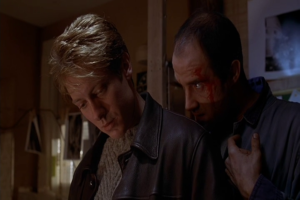
Said death cult includes a man eagerly working on his Jane Mansfield costume for their next crash reenactment, and a woman with legs in braces like a kind of low-fi cyborg produced through bodily harm. (The prominent wounds on the backs of her legs come to some… interesting use later in the film. Her leg wound… had a clit, right? I didn’t see one. I mean just a kind of overall vaginal outline with a little nub of sorts where one belonged. I know what you meant.)
The rest of the movie has the characters do things like watching crash test tapes while jerking one another off round robin-style, cruising around getting into near-accidents for sexual titillation, and fucking one another in almost every available pairing. This is the light stuff, this is the Prancing Pony stage of this quest to Mount Doom.
Deborah Kara Unger is absolutely fucking fearless she a’ight in this movie, both in what she lets us see and the complex emotional states she’s willing to dive into. The scene of Ballard fucking her from behind (which gets mirrored at the end of the movie by him repeatedly rear-ending her? And then fucking her from behind Shhhhhh) while she questions him insistently in a dirty-talk voice about whether he wants to fuck Vaughan (also mirrored) is beyond what any actress since Lina Romay would willingly do on camera. (Yeah, I like her character, but her dirty-talk voice never shuts off and it’s kinda grating to me.)
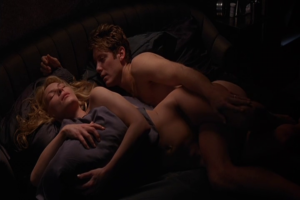
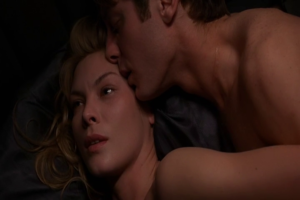
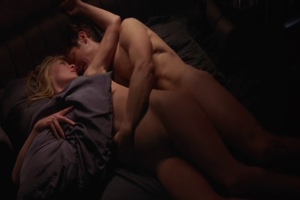
Additional credit should be given to Howard Shore, who provides a lot of tension with his restrained score, which is of the kind they call “brooding.” We kept imagining him saying, “So… what am I scoring today, David?” but he always finds the mood somehow, giving a dark cast to every sex scene and… other sex scene. Like the legless woman says about Vaughan’s photography, “[he] makes everything look like a crime.”
Elias Koteas as Vaughan is so great that we’re angry we don’t know who he is. His lines and facial expressions and gestures are all … taut? Like a creepy calm stretched thin over a nervous, horny, apocalyptic energy. He has the benefit of incredible lines though:
“James Dean died of a broken neck and became immortal.”
“It’s not the police, it’s the Department of Transport. It’s a joke. They have no idea who we really are.”
“Did I seem glib? ‘James Dean died of a broken neck and became immortal.’ I just couldn’t resist.”
“No, I live in my car. This is my workshop.”
“I use it to test the resilience of my potential partners in psychopathology.”
“This is not a medical tattoo, it’s a prophetic tattoo.”
Crash revisits a lot of thematic shit from Cronenberg’s earlier Videodrome, in that both films prove that sex and death and technology are having some excruciating orgy in David Cronenberg’s brain <3, and he can make a heck of movie out of it. (A throwaway line in this film, “That’s tape player’s fucked!” almost seems like a retrospective summary of Videodrome.)
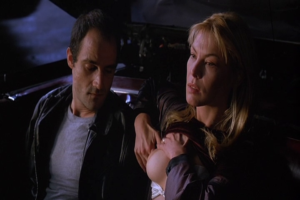
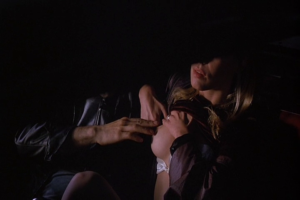

I really like this sequence where the convertible’s roof and windows come up around them during foreplay, like the machine is closing around them.
So Vaughan’s religion does turn out, in one scene, to have a theology. We aren’t really capable of understanding it at this time. He describes a car crash as a release of sexual energy or something. Fuck. Here’s what I’m getting: Every wound is an opening. The traumatic or explosive energy of a car crash creates an opportunity for uh…. Some kind of sexual-religious transcendence, the psychosexual equivalent of becoming a cyborg for a moment. Or um… the world of frail humans and soulless machines is broken open and all the boundaries blur and you ejaculate furiously. Orgasm, death, and becoming a machine are all just ways to break out of the quiet desperation* of your shitty little pedestrian self. Coming… becomes becoming?
Ok, so… Valhalla (/orgasm) is reached by dying in a car crash, a la the warriors who have gone before us like James Dean and (honorable mention) JFK, immortal legends of the 1960’s American Graffiti era. That’s all I know.
It is Viking warrior death meets dying in a car crash – kinda the Warboys’ religion in Mad Max Fury Road but… more like Charles Manson meets Fast and Furious.
*“The mass of men lead lives of quiet desperation. What is called resignation is confirmed desperation. From the desperate city marriage/hangar you go into the desperate country death cult, and have to console yourself with the bravery of minks and muskrats Cronenbergs and cripples. A stereotyped but unconscious despair is concealed even under what are called the games and amusements fucking of mankind. Still better than Fight Club though.”
-“Henry” “David” “Thoreau”
